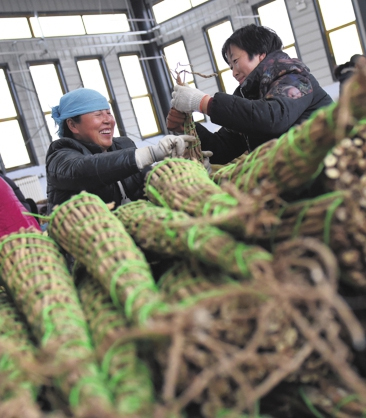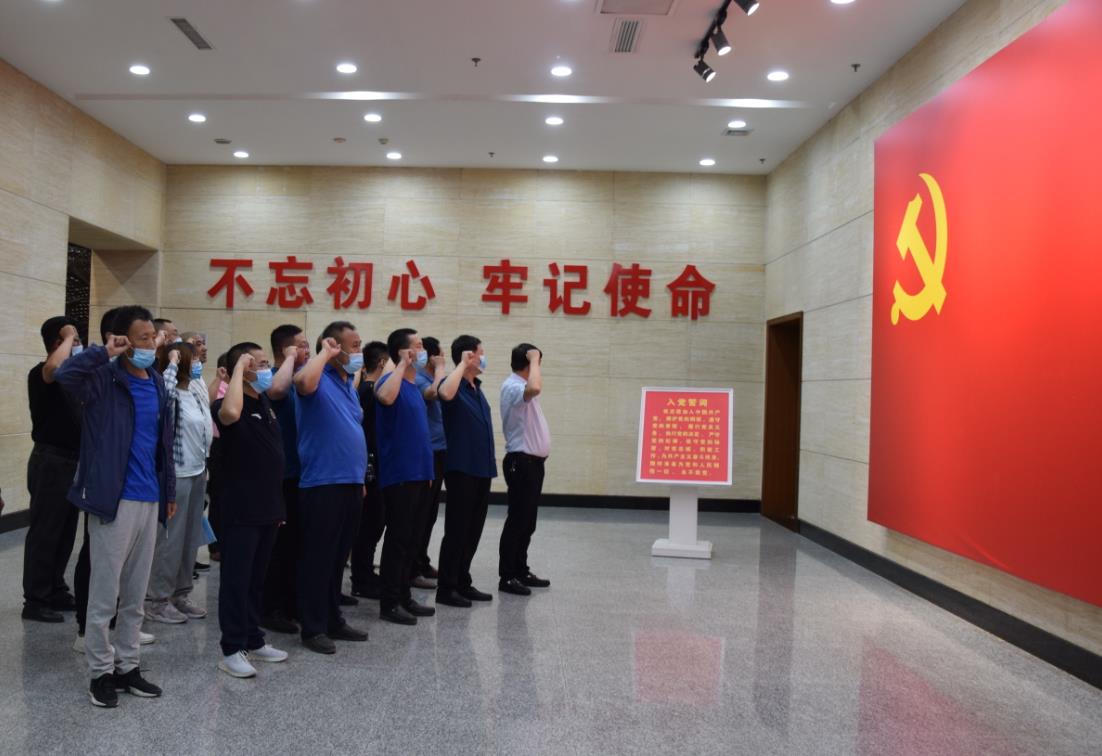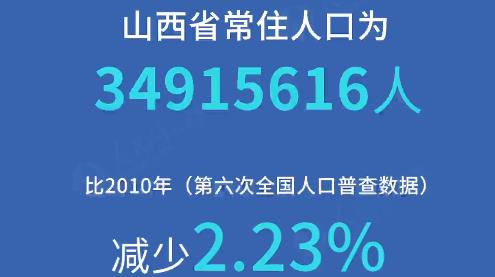
Workers sort astragalus roots before they are delivered to herbal tea producers.HUO FEIFEI /FOR CHINA DAILY
Workers sort astragalus roots before they are delivered to herbal tea producers.
Shanxi province is putting its hopes on the emerging herbal tea industry to revive its rural economy and help to reduce poverty in the countryside.
Tea made from Shanxi's medical herbs such as astragalus, forsythia, chrysanthemum, wolfberry and sea buckthorn are increasingly recognized by consumers throughout the country.
As the market size of the industry grows, more farmers in Shanxi are engaged in planting medical herbs and producing and selling herbal tea products. They see the industry an important means to increase income and relieve poverty.
When early autumn came in the middle of September in the high-altitude, mountainous village of Daqiao in Hunyuan county, local farmer Zhang Ji was busy harvesting astragalus roots on his farm.
"I estimated my family's total income from selling the herb this year should be more than 20,000 yuan ($2,930), given the total output of 650 kilograms and the price of over 32 yuan a kilo," Zhang said.
Zhang began to see substantial growth in profit from growing astragalus in 2016.
"I discovered the price of astragalus roots grew steadily since the early 2010s. However, sales were not good because of poor road connectivity," Zhang said.
Zhang and his fellow villagers built a road to link the village and the rest of the county in 2016. As a result, the villager welcomed more dealers to buy the herb.
"We earned 16,000 yuan that year, which immediately lift my family from poverty," Zhang said, adding that his astragalus farm now grows to more than 5 hectares.
Zhang said the astragalus roots collected from his village are especially popular among medical herb purchasers.
"It takes six years for the astragalus to mature, so the quality of the product is ensured," Zhang explained.
According to Zhang, the total growing area of astragalus is more than 1,300 hectares in Daqiao village, with per capita growing area of 1.3 hectares.
Hunyuan county in northern Shanxi is renowned for its astragalus industry. Locally produced astragalus has been used for medicine production for more than 1,500 years, according to Zhang Jiuying, head of the county's herbal medication development center.
"Astragalus can be found in many parts of China, including Gansu, Shandong, Hebei and Sichuan provinces. However, astragalus in Hunyuan is especially famous for its quality," Zhang Jiuying said.
The average content of saponin-the effective ingredient for medication-in astragalus is 0.04 percent in China. But the content in Hunyuan's products is more than 0.16 percent on average, Zhang explained.
For this reason, Hunyuan astragalus became a geographical indication-protected product in 2014.
To increase added value for the product, Hunyuan's astragalus is currently widely used in making herbal teas, in addition to producing medicines.
The county recently established an astragalus tea industrial park to engage more individuals and businesses in the production, research and development and sales of the herbal tea products.
Hengshan Typical Herbal Tea Industry founded by local entrepreneur Zhao Fugui was the first company settled in the industrial park.
With a total investment of 170 million yuan, the enterprise's herbal tea production facility is scheduled to be operational in two years.
"Upon completion, our company will be capable of producing 160-million-yuan worth of astragalus tea a year," Zhao said.
Hengshan Tea Industry, founded by the Ciyao township government in Hunyuan, is another major astragalus tea producer in the park.
According to Wang Zhuoxiang, head of the Ciyao township government, the company can produce 15 metric tons of herbal tea products a year.
"This is a major poverty-relieving project founded by the township government," Wang said, adding it mainly purchases ingredients from impoverished families."Last year, we bought more than 15 tons of ingredients from 86 poor families in Ciyao."
Guo Yanjie contributed to this story.
By YUAN SHENGGAO
 山西路桥:党建引领 建好“四好农村路”山西路桥建设集团党委扎实开展“党建质量提升年”,实施“六大工程”,立足“十四五”高质量、高速度、高效益发展的战略基点,全面提高党建质量和党建引领发展水平,为打造“国内一流的交通基础设施投资、建设、施工现代化企业集团”提供坚强政治保障。
山西路桥:党建引领 建好“四好农村路”山西路桥建设集团党委扎实开展“党建质量提升年”,实施“六大工程”,立足“十四五”高质量、高速度、高效益发展的战略基点,全面提高党建质量和党建引领发展水平,为打造“国内一流的交通基础设施投资、建设、施工现代化企业集团”提供坚强政治保障。
 常住人口3491万 山西人口普查数据"出炉"山西省统计局向社会通报山西省第七次全国人口普查主要数据。数据显示,山西省常住人口为34915616人,比2010年(第六次全国人口普查数据,下同)减少2.23%,年平均减少0.23%。山西省常住人口总量减少,主要受人口流动变化等因素影响。
常住人口3491万 山西人口普查数据"出炉"山西省统计局向社会通报山西省第七次全国人口普查主要数据。数据显示,山西省常住人口为34915616人,比2010年(第六次全国人口普查数据,下同)减少2.23%,年平均减少0.23%。山西省常住人口总量减少,主要受人口流动变化等因素影响。